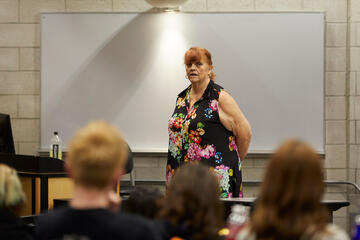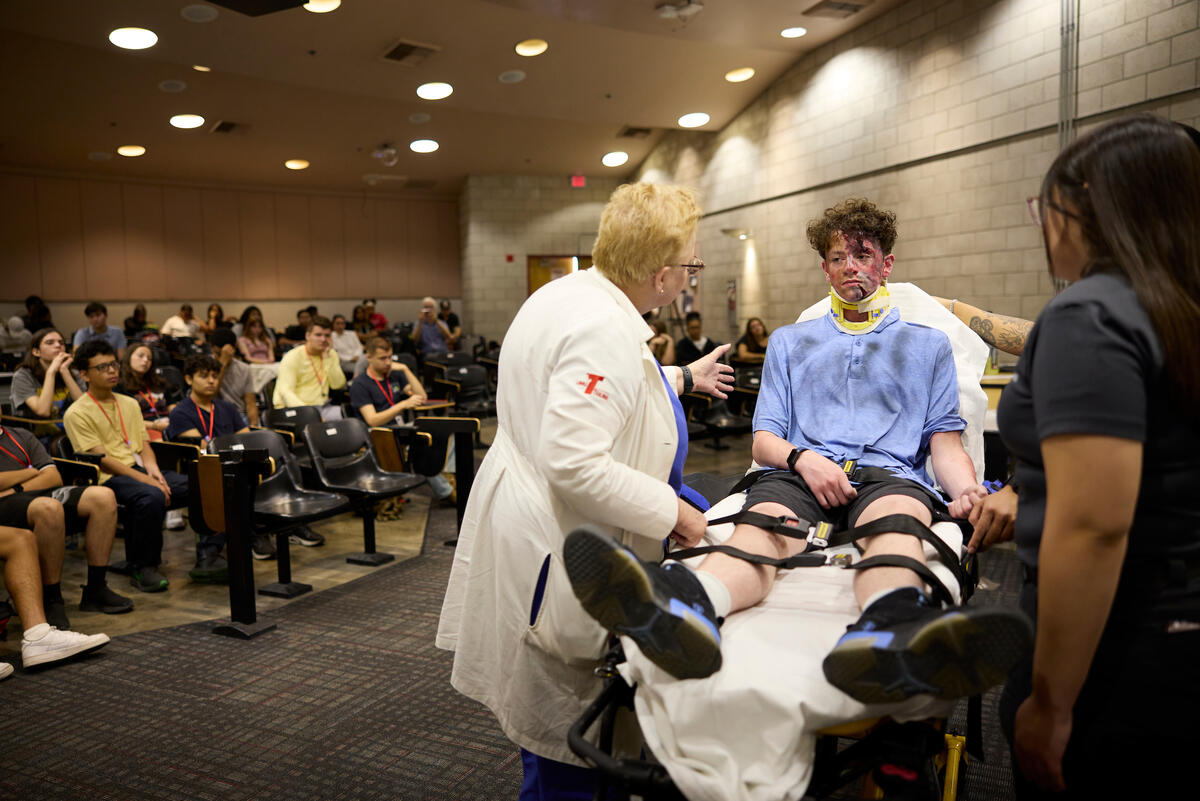As 16-year-old Seven Hussein learns to drive along the roadways of Southern Nevada, he does so with more than just his learner’s permit in hand.
He brings perspective as a frequent vulnerable road user — that is, someone who does not always rely on a car for transportation. It's something that many in the auto-dominated streets of the West often forget about.
“I take the bus to school, and I take the bus to work,” he said. “I like how the buses run on a very consistent schedule. And the apps that they have to help you plan out your ride has been very beneficial. But, you do have to be careful when it comes to your safety.”
The student at Innovations International Charter School of Nevada and an aspiring pilot is pedestrian as he walks from home to bus stop to his destination. "I’ve almost been hit a few times. Living in a city like this is very dangerous because it’s very populated."
He also brought that perspective to the 2024 National Summer Transportation Institute (NSTI) at UNLV. The annual summer program that immerses high-achieving high school students in the issues of transportation systems and engineering, urban infrastructure planning and pedestrian safety, while also exposing participants to STEM careers and college pathways.
The two-week program highlights upcoming trends in transportation technology and shows students how to apply sustainable solutions to systems design. It is led by Joanna Jezierska, director of the Multicultural Program for STEM and Health Sciences and funded by the Federal Highway Administration and the Nevada Department of Transportation.
NSTI, in its current format, celebrated its 10th year this summer.
“Our camp is one that is continually used as a model to showcase what other transportation summer camps can be,” said Erin Breen, co-lead on the camp and director of the Road Equity Alliance with the Transportation Research Center at the UNLV College of Engineering.
Inspiring the Next Generation of Traffic Engineers
For two weeks, students lived on campus and explored a laboratory — the streets of Las Vegas — in a way they’ve never experienced before. They learned about the safe system approach for designing streets from UNLV experts, community partners, and engineers from the Regional Transportation Commission (RTC) of Southern Nevada, the Clark County Office of Traffic Safety, and the City of Las Vegas.
“If you build a road that’s safe for a pedestrian, you’ve made that road safer for every road user,” said Breen, adding that many streets in the West were not designed with this ideal in mind.
Armed with information learned in seminars, site visits and hands-on activities, students were asked what they would do to make several streets in Southern Nevada safer for all, not just a driver behind the wheel.

“Three of the four teams worked on projects that currently exist in Southern Nevada,” said Breen. “They were not shown the renderings, but they were given the framework of the problem and asked to design what they think would be the solution.”
Hussein’s team was tasked with providing solutions for what Breen calls the “triangle of doom”: the intersection where Boulder Highway, Flamingo Road, and Nellis Boulevard converge. It has been the site of many pedestrian fatalities.
“It’s a very confusing intersection,” Hussein said. “I’d rather drive on back streets than to drive through that area.”
His team proposed solutions such as weighted curb extensions, which would decrease the overall width of the roadway and give pedestrians more room to safely navigate the busy intersection. The extensions also would automatically detect the weight from pedestrians, signaling drivers to stop and giving pedestrians the right of way.
On the final day of the camp, Hussein’s team took home the grand prize — and bragging rights — for their proposal and presentation.
Brij Gulati, director of capital projects for the RTC and a NSTI mentor, said this year’s cohort was an “engaged group of eager students who have fresh ideas and a real demand for quality infrastructure.”
“Partnering with programs like UNLV’s NSTI allows the RTC to bring a new generation of Southern Nevada citizens into the workforce to create solutions that work for our large community and help inspire them to be the next generation of engineers, planners, and a variety of other professionals,” Gulati said.
Breen agreed.
“We need good, young, highly motivated, free thinkers to become traffic engineers and planners,” Breen said. “These students are my big hope. They are definitely our best glimpse into the future and reassure me that we’ll be in good hands.”
The level of community buy-in for NSTI year after year also encourages Breen. UNLV’s partnership with agencies like Clark County Fire, the Las Vegas Metropolitan Police Department, University Medical Center (UMC), and others is never more on display than on Teen Driver Safety Day. For one day out of the camp, UNLV invites teen drivers or soon-to-be drivers in the Las Vegas community to attend a highly interactive education program led by community partners in order to understand the consequences of distracted and impaired driving.
“One bad choice or one mishap can really change somebody’s life,” said Hussein. “It’s been a very big lesson from this camp. We need to learn how to make the road a safer place, and it starts with us making smart choices.”
Teen Driver Safety Day has also never been needed more than it has now. The number of teen driver deaths in Clark County has already surpassed the number of deaths at this time last year.
“What I love most about this camp is that it brings together all the different partners we have in the community in ways that really showcase the willingness of people to participate and help young people reach their full potential,” said Breen.



